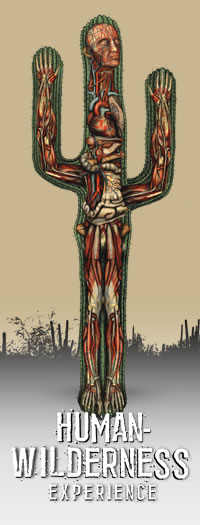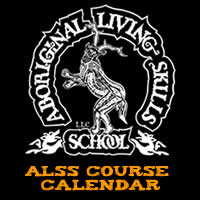Commonly asked questions regarding our COURSES
by Cody Lundin
- Which course should I attend first?
- What’s the difference between a modern survival skills course and a primitive living skills course?
- Who teaches the courses?
- What type of person trains at ALSS?
- How many students are in each course, and what is the age limit?
- Do I have to eat bugs??
- Are ALSS courses safe?
- Do I have to be physically fit to attend?
- What type of gear do I need for my course?
- Why not have your course gear lists on-line?
Which course should I attend first?
Choosing the right course for your needs depends upon your intention for training. Reading the FAQ’s below about the differences between primitive and modern skills might help you decide. If you’re unsure about which ALSS adventure is the right choice for you, please feel free to contact me directly for more information.
What’s the difference between a modern survival skills course and a primitive living skills course?
While primitive skills and modern survival skills overlap in key areas, namely staying alive either short or long term, their similarities end quickly. If you’re concerned about your safety in a 21st century wilderness emergency, and want to learn how to prevent and deal with crisis scenarios, start by learning modern survival skills. If your intention is exploring indigenous cultures and the natural world, or learning how to do more with what nature provides, choose a primitive living skills course. Ultimately, knowing both will give you the greatest outdoor enjoyment and adaptation possibilities. In essence, modern survival skills revolve around being rescued by a third party from a life threatening scenario. Primitive living skills assume that you are living-off-the-land for extended periods of time - a big difference in training motives and methodology. top
Unless specified otherwise, Cody Lundin is the lead instructor on all ALSS courses. Instruction is intense yet taught in a non-intimidating manner and courses are packed full of information without sacrificing attention to detail. top
What type of person trains at ALSS?
ALSS courses are not “Rambo-esque” flavored adventures; nor are they mystical, smoke-a-joint, hug-a-tree, shamanic journeys. All classes are taught with a passion for life and a responsibility to self, others, and the natural world. Not surprisingly, our clientele reflects this fact. Over the years, we have seen virtually every type of person enroll and successfully complete our courses. From teenagers to those well past their retirement age, we have shared and laughed with amazing men and women of all classes and colors, rich and not rich, atheist or religious, physically fit or unfit, the list goes on and on. The commonality they share is a desire to do more with less and gain a greater confidence within themselves and their connection with the great outdoors. top
How many students are in each course, and what is the age limit?
Although we have taught custom courses to more than 60 high school students at once, (groan) regular ALSS offerings have a maximum enrollment of 8 to 12 students ensuring you plenty of personalized learning, maximum adventure and fun! Unless a potential student is 16 years old or older (for most courses), they must be accompanied by a parent or guardian to attend. top
It depends upon which course you choose and how well you hunt. Food has a low priority in a modern survival situation but is extremely important in a primitive living skills scenario. In any event, I’m not going to force you to eat bugs. top
No wilderness experience is without risk. Anyone who tells you differently, frankly, is either untruthful or a fool. Anytime a person combines the variables of human nature with Mother Nature, all bets are off. A large part of your wilderness self-reliance training begins with taking responsibility for your actions. Only by doing so will you become fully empowered with the qualities of attitude, adaptation, and awareness, all key elements to your survival and overall enjoyment of the outdoors.
Every ALSS course involves many years of intense back country planning and experience whether you choose from our adventure courses or our skills courses. There is no substitute for instructor experience when assessing problem situations that can arise in the wilderness. It doesn’t matter how long a survival school has been in business if your instructor has only a few years of “dirt time.” Good judgment, problem solving skills, and the overall assessment of your safety in the outdoors are learned over many years of back country experience; and no one can cheat their way into becoming a competent survival skills instructor.
When attending an ALSS course, participants are made aware of the potential risks involved and must accept them as part of the experience that makes our training unique. Once ALSS makes students aware of the risks, participants are allowed to implement whatever level of consideration they feel is appropriate, so long as it does not endanger or compromise the program, other participants or staff.
If you’re looking for a comfortable, catered, and “safe” outdoor experience, please look somewhere else. If you desire instead a challenging, supportive, and honest look at yourself and the outdoors, you’ve come to the right place. Adventure is based upon uncertainty and exposure to risks and their consequences. In short, ALSS provides the training, appropriate equipment and/or increased supervision to enhance your experience in an otherwise unsafe environment, but we, like everyone else, cannot guarantee a “safe environment.” Please contact me with any questions you may have regarding our courses. top
Do I have to be physically fit to attend?
Some ALSS courses demand that you be in reasonable physical condition such as the Desert Drifter or The Ultimate Abo. Regardless of this statement, overweight people and folks in their early 70’s have successfully completed adventure courses. While challenged at times, they succeeded because they refused to give up and had the encouragement and support of their classmates. Diversity within a tribe, both in levels of skill and physical fitness and development, is something indigenous peoples lived with day in and day out as grandma and the kids were part of the group as well.
Skills courses revolve around primitive or modern base camps and are more focused on skills than the journey itself. Most allow you to bring your own food and sleeping gear. Our adventure courses require that you be in good physical condition due to the advanced nature of the experience. Feel free to contact me if you have any questions regarding your participation. top
What type of gear do I need for my course?
The gear you’ll need for your adventure depends upon the course you choose although no ALSS class has a heavy emphasis upon modern gear. After you enroll, you will be sent a complete gear list with required items. The gear required for most courses is extremely simple, consisting of a backpack, sleeping bag or wool blanket, water bottles, knife, and extra clothing. Those without basic backpacking gear often rent supplies from a local outdoor store or borrow items from a friend. If you’re worried about not having the right equipment, remember, the ALSS experience revolves around doing more with less, not buying expensive, seldom used specialty gear. top
Why not have your course gear lists on-line?
Because our courses are taught outdoors, and weather and climate factors are fickle, our gear lists remain flexible so we can edit them for safety and effectiveness. One-size-fits-all gear lists ignore the reality of a changing wilderness and the hundreds of variables that exist. top




